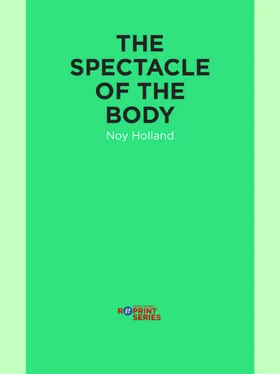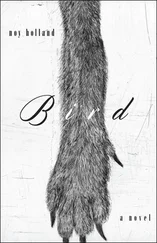“Mr. Brooks,” says the boy from Memphis, “sit up now. This is your wife and friends.”
RC crouches until he hears them shuffling beside the doors of the car and then he sits up, cocks his head in the window. Sees nothing but the slumpy loveliness of females drinking gin. Ida lets herself drop to one knee on the concrete slab where the gas pumps sit and spoils the moment for him; she starts to cry — dry, choking sounds — and soon everyone is at it; even his Verda is at it, who hasn’t cried since her own wedding night in 1923. RC keeps moving his head around to cast his one eye over them all, except for Opal; he tries not to look at Opal, as big as she is, and talky.
“Well, me,” Opal is saying. “Will you lookit that? Will you lookit that?”
RC looks like something gone soft in the ground all the hard winter long, his body boneless, his face bunched off to one side. The skin of his face is slick as clay and crawling, spattered with yellow scars.
Opal dabs at her nose with a tissue, reaches for Verda’s hand.
“I tried to tell you,” Verda says. “I told you.”
She tries to think what her husband looked like when he looked like himself at all. RC’s heart knocks. His mouth gets parched.
“Y’all don’t stroke out,” Lola says to them all. “Everbody breathe.”
They do, a shallow, helpless wheezing.
The boy comes around and opens the door and swings RC’s thick legs out. “I got to go, ma’am. Let’s move,” he says.
Verda tips in, kisses RC on the side of his head that has got his face still on it. She works an arm underneath her husband’s legs, slings her other arm behind his back, says, “Come on, Pop. Let’s get you in. We have fixed your store so pretty.”
Before his dog died, before the TV, and the do-less days that did him in, the days that we quit coming, RC swept and stocked the store, provided, profited, tallied the bills in the bank box — before the gin and cards, before the bulk of RC’s bitch went off on the grill of a livestock truck on the road through Union City. Which is why, we say, he got the TV, tallying, too, the new road, the four-way light, the litter, tallying the loggers, their rotgut, hard-mouthed wives. Floridians, we tally, sausages in cans, motorcars and moon walks, the chalky bed that used to be the river RC fished from.
RC, he pulled his boots off. That’s what we say in town.
He took to letting Ida slub his feet while, on the TV, brassy, hulking hunks beat their chests in the golden light — Valiant Val Sandini, the Invincible Flavius Ray — squawkers, strutters, rubbering off the ring ropes through the dogless autumn, the seasons of deer and squirrel.
The walnuts drop and dimple the roof and roll off onto the gravel lot. When it was RC’s daddy’s store and we skidded our bikes on the broken shells, we knew from the far-off shrill of the train how hard we had to ride to reach the tracks before it passed on — past the icehouse and the Leader store, before the new Winn-Dixie, before any of this that will come to pass had made its way into town.
The days go along like this now: RC in his barber chair, eating graveyard stew. The Knights of Columbus go see him. Kiwanis goes with chicken salad, the sixth-grade class with bright balloons they have painted rainbows on. Motorists from Florida slow and stop and soft-shoe in, blinking from the sun.
“Leaf peepers!”
“Junior Leaguers!”
“Philanthropists!”
“Baptists!”
Opal could cut out their tongues.
It is not that she hates a long-tongue, who loved, after all, RC. Hadn’t all the girls loved RC, after all? A wide man, a talker. A story! A story! Tell us about Sarasota, RC. Sweet thing. Love.
But he won’t speak; RC won’t eat — but to eat bread soaked in sweetened milk, Verda’s graveyard stew.
But to eat, the first sounds RC makes, he makes when his buddy Buddy comes to tell RC a little story.
“RC, he’s down to the corner, like that, standing at Finn and Pearl. He’s walking up and down the sidewalk. He has got his binocs on. I say, ‘What’re you doing out here, RC?’ ”
Buddy keeps his coat on, leans against the counter in the draft of the open door. “Don’t you know he is out there trying to keep the elephants out of town.”
“Elephants?” Opal says. “That’s ridiculous. Ain’t no elephants around here.”
This makes RC snort; he brays, and the milky phlegm from the graveyard stew spits through his pinched-up nose.
“God above,” says Opal.
She gets behind him, hooks her arm around his neck to keep him in his chair.
“Oh, pitiful, pitiful man,” Lola says. “I have got to go home.”
Lola is the first to quit them.
Ida goes to the bank box, fills her Dixie cup with gin. She says, “Can’t a fellow laugh ever once in a while?”
“Why, Ida,” Verda says.
“Well, can’t he?”
“Yeah, ma’am,” Buddy says, “that’s what I say,” moving to the door. “ ‘RC,’ I say, ‘when’s the last time you seen a elephant around here?’ He kindly gets his eye up so. He’s shaking his change in his trousers. ‘I’s doing a pretty good job, ain’t I? Pretty darn good job,’ he says.”
Buddy never comes back. Lola stays away.
Verda keeps the high shelves stocked. Every can of peas the girls eat from the shelves, Verda replaces with two cans, pulling the old cans forward, sliding the new behind. Nothing leaves the shelves but what the girls eat, and they feel they have eaten nothing.
The days grow colder. Opal goes out with the wheelbarrow, foraging for wood. Ida feeds a slow fire in the woodstove. They make suggestions — cold-weather soups and pot roast, greens with ham and bacon grease, the way he likes greens, the way they know that RC likes greens. But all he will eat is graveyard stew.
After school, the kids come with their lunch pails, open the pails at RC’s feet to pick out what they have saved him — bologna scraps and ribbon snakes and lumps of macaroon. The schoolgirls try to feed him. The boys pocket gum and candy; they scorch snakes and toads on top of the stove.
“What happened to you, RC?” the boys ask.
“What happened to RC?” ask the girls.
Here is how Verda tells it; RC, he had a accident.
We sit; we wait. Weeks pass, years.
RC, he had a accident.
RC, he had a accident. Shot hisself in the head.
“Remember that old Ford, RC? The one my momma drove? We would drive it down here for a fill-up — it was about the only place I think Momma ever drove. It was still your daddy’s place. The gasoline pumps wasn’t busted up like they are right now. RC”—Verda breathes in and looks at him—“things should have been took care of.”
RC sits there with his head full of shot, looking like he is listening, and then like he is not. He starts twitching in his barber chair, working it up to pitch and squeak, trying to keep enough noise in the store that he can’t hear Verda talk.
She says, “Momma’d go in and buy some things while I sat in the sun in the car. I watched the mirror to see you coming. I don’t guess I recall ever coming to the store without you letting the door slam to and walking across the lot out there to lean on the car and talk. My God, RC. You’d lay your arms on the car like you do and talk about, I don’t know, fishing. It didn’t matter. I never did care what you talked about. I just liked to see you.”
RC is quiet again, listening. The other girls are listening. Verda smoothes back her hair and goes on.
“Momma’d come back out and get in the car and say good-bye to you. Then she’d start to pull the car out. But you would never move, RC. You would never quit talking. You’d be leaning on the car while it moved off with your arms rubbing over the rooftop, still looking like we were there. I’d watch in the mirror to see you. I was too shy to turn around. Pretty soon I didn’t want to see you at all in the mirror or any other way, except I couldn’t help it. I’d tell Momma to hurry up — because I heard you still, and I thought to myself, When he stops talking — I remember telling Momma this — saying, ‘Momma, if he stops talking, he will fall like a tree in the dust.’ We would just, Momma and I — what could we do? — keep driving.”
Читать дальше











